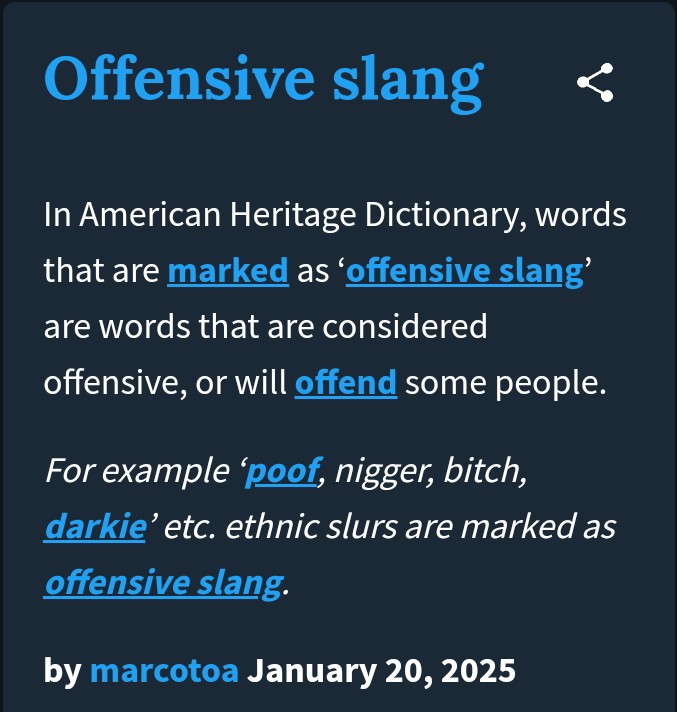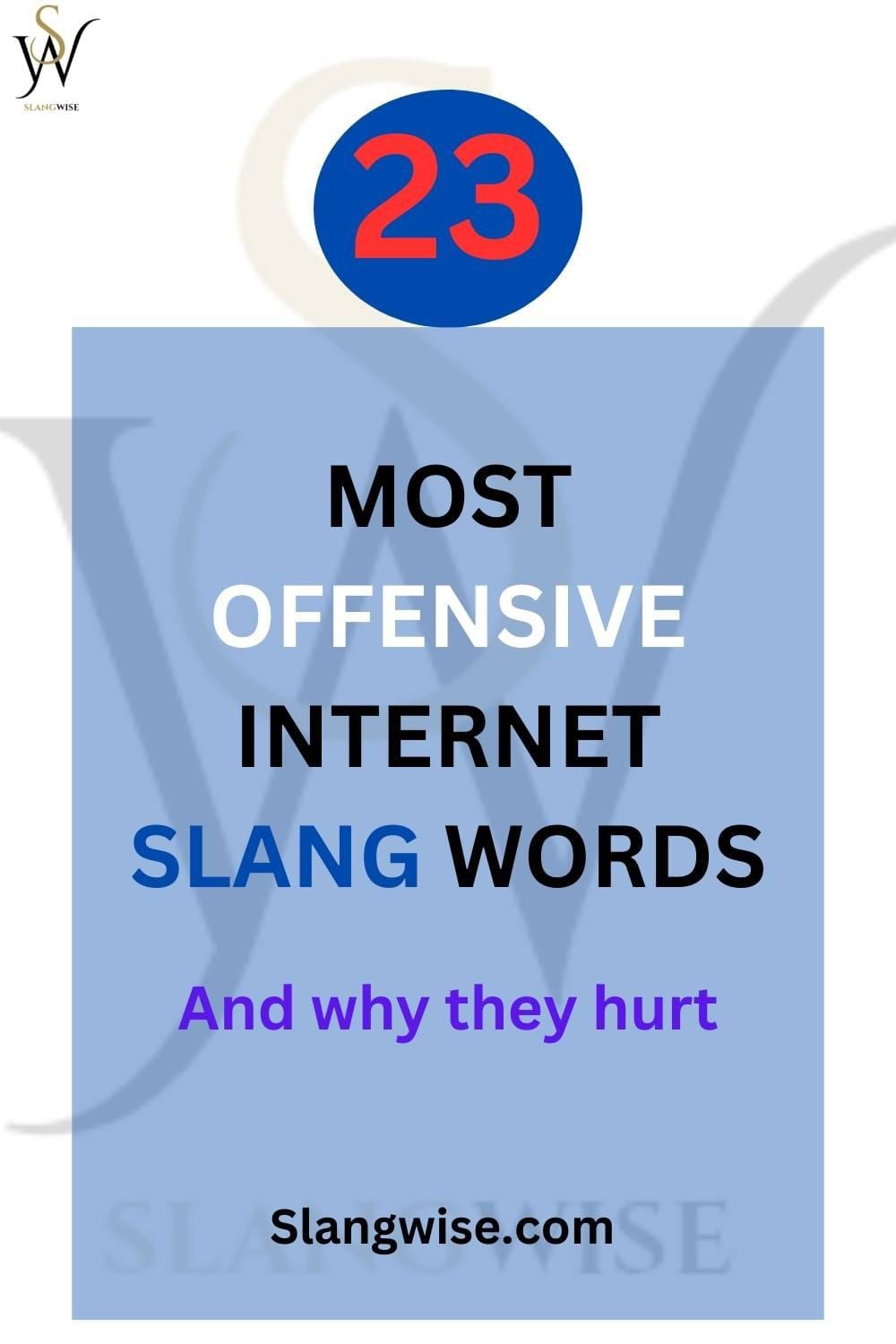I’ve spent countless hours mapping the wild evolution of internet slang words, and one thing’s clear: not all slang is harmless fun.
Some terms cut deeper than a simple jest, targeting identity, appearance, or emotions in ways that sting.
In this comprehensive guide, I’ll walk you through 20 of the most offensive internet slang words of 2025, I’ll explain their origins, and show you why they’re problematic.
By understanding these words, you’ll avoid unintended hurt and help foster a more respectful online space.
Knowing which terms offend empowers you to choose your words, and your community, more wisely.
Slangwise
Key Takeaways
- Context is everything. A word harmless among friends can wound in broader forums.
- Origins often lie in AAVE, gaming, or meme culture. Misuse of these terms erases history and identity.
- Many terms belittle personal traits. Race, age, gender, ability, and mental health are common targets.
- Awareness fosters empathy. Rejecting offensive slang promotes inclusivity and trust.
Table of Contents
What Makes Internet Slang Offensive?

- Mocking or Dismissive Tone: Words like “cheugy” or “salty” can trivialize someone’s taste or feelings.
- Stereotype Reinforcement: Terms such as “beta” or “noob” lock people into demeaning roles.
- Targeted Insults: Labels like “Karen” or slurs attack identity and perpetuate prejudice.
- Emotional Harm: “Gaslight” or “ghost” echo real-world abuse dynamics, minimizing survivors’ experiences.
The 20 Most Offensive Internet Slang Words of 2025
1. Cap
Cap refers to lying or exaggerating, and when someone says “no cap,” it means they are being truthful.
The slang is often used to accuse someone of not telling the truth.
2. Cheugy
Cheugy describes something or someone who is outdated or trying too hard to be trendy.
Cheugy is used to mock those who are seen as following old or out-of-fashion trends, like wearing outdated styles or using phrases from the past.
3. Delulu
Delulu is a playful shortening of “delusional” used to mock someone’s unrealistic expectations, often in the context of fandoms.
Delulu implies that someone is being overly hopeful or imagining things that aren’t grounded in reality.
4. Extra
Extra refers to someone who is over-the-top or excessively dramatic.
It’s often used to call out people who seem to be doing too much, whether in their emotions, actions, or personal style.
5. FOMO
FOMO stands for “fear of missing out,” and it describes the anxiety or regret someone might feel when they see others enjoying something they are not part of.
It’s often used in a joking way but can also highlight deeper feelings of insecurity.
6. Ghost
To ghost someone means to suddenly cut off all communication without explanation.
This often occurs in relationships or friendships, leaving the other person wondering why the contact was abruptly stopped.
7. OK Boomer
OK Boomer is a phrase used to dismiss the opinions of older generations, particularly Baby Boomers, in a sarcastic or condescending manner.
It’s often used when younger people feel that older people are out of touch with modern issues.
8. Noob / Newb
A noob (or newb) is someone who is inexperienced or unskilled at something, particularly in gaming.
It’s often used to insult or tease people who are beginners or making obvious mistakes.
9. Salty
Being salty means feeling bitter, upset, or resentful, usually over something minor.
It’s used to describe someone who is holding a grudge or reacting negatively to a situation.
10. Stan
To stan someone means to be an obsessive, dedicated fan.
It originates from the Eminem song “Stan,” which tells the story of a fan who takes his admiration too far, and now refers to extreme fandom behavior.
11. Troll
A troll is someone who deliberately provokes or harasses others online for fun or to elicit strong reactions.
It involves posting inflammatory or upsetting comments with the intent to disrupt or upset others.
12. Throw Shade
To throw shade means to subtly insult or criticize someone.
It’s often done indirectly, using backhanded compliments or remarks that seem harmless on the surface but are meant to sting.
13. Woke (sarcastic)
Woke initially referred to being socially aware, especially about racial and social justice issues.
However, it’s often used sarcastically to mock people who are seen as excessively politically correct or socially aware.
14. Vibe Check
A vibe check is a term used to assess the energy or atmosphere of a person, place, or situation.
It can be used positively to gauge a good feeling but is sometimes used negatively to exclude someone who doesn’t fit in.
15. Rent-Free
If something or someone is “living rent-free” in your head, it means you’re obsessing over them or thinking about them too much, often in a negative or unproductive way.
It’s used to mock people for spending too much mental energy on something trivial.
Read & Beware: 7 Innocent-Sounding Slang Words That are Secretly Fueling Hate Online.
16. Simp
A simp is someone who is excessively affectionate or submissive to someone they’re attracted to, often to the point of being over the top or sacrificing their own needs for the other person.
It’s often used to criticize someone for being overly generous in a relationship.
17. Karen
A Karen refers to an entitled, demanding, and often rude person, usually a woman, who expects special treatment or acts aggressively in public situations.
It’s a stereotype often used to call out privileged or unreasonable behavior.
18. Cringe
Cringe describes something that is embarrassing or awkward to the point that it makes you feel uncomfortable.
It’s used to express secondhand embarrassment for someone’s actions, often in a public or awkward setting.
19. Beta
Beta refers to someone who is seen as weak, passive, or inferior in social dynamics.
It’s often used to compare people to “alpha” figures, implying that the “beta” lacks strength or leadership qualities.
20. Gaslight
To gaslight someone means to manipulate them into doubting their own perception of reality or sanity.
It’s a form of psychological manipulation where the victim is made to feel that their thoughts or feelings are invalid or irrational.
Why These Slang Terms Remain Popular
- Virality & Mimicry: Catchy phrases spread quickly on TikTok and Twitter, often without context.
- Group Identity: Using in-group slang can feel bonding, yet it excludes or offends outsiders.
- Shock Value: Provocative words grab attention, but at the cost of real harm.
Offensive slang often functions as social currency, until it marginalizes the very groups that create it.
According to Dr. Maya Singh, sociolinguist at NYU,
How to Respond to Offensive Slang
- Pause & Reflect: Consider the impact, not just the intent.
- Set Boundaries: Politely call out harmful terms“That word can be hurtful; can we use something else?”
- Educate: Share why a term is problematic, linking to credible resources if needed.
- Move On: If the speaker refuses to change, protect your well-being by muting or leaving the conversation.
Final Thought
Language shapes our world, and when slang cuts deep, it can fracture trust and community.
By recognizing these 20 offensive slang words, you’ll navigate online spaces with greater empathy and care.
Let’s use our words to build bridges, not barriers.
FAQs About Offensive Internet Slang
Only if you understand their history and implications, and ideally, if you belong to that culture. When in doubt, steer clear to avoid appropriation.
Acknowledge the mistake, apologize sincerely (“I’m sorry I used that word; I understand it’s hurtful”), and commit to not repeating it.
Humor doesn’t erase harm. Jokes at the expense of marginalized groups reinforce stereotypes, choose comedy that uplifts rather than degrades.

